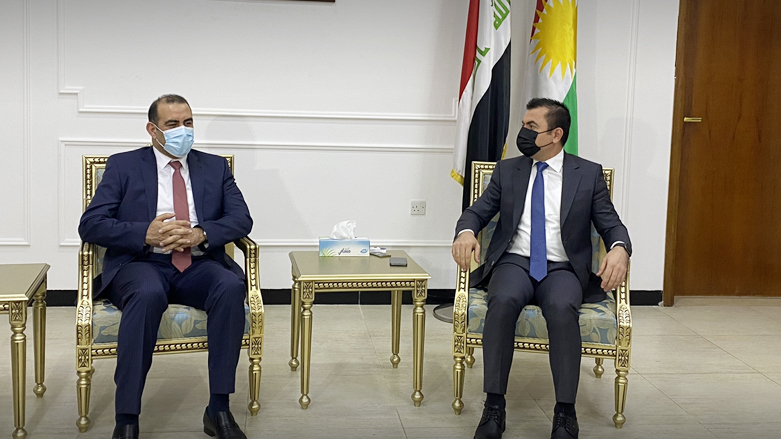Iraq census must not be 'politicized,' should include disputed territories: KRG minister
Cabinet members from Iraq's federal government and the Kurdistan Regional Government (KRG) met in Erbil on Thursday to discuss various pressing issues between the two, with the belated national census topping the list.ning ministers of the Kurdistan Region and Iraq's federal government held a meeting Thursday to discuss pressing issues, including a belated national census.

ERBIL (Kurdistan 24) – Cabinet members from Iraq's federal government and the Kurdistan Regional Government (KRG) met in Erbil on Thursday to discuss various pressing issues between the two, with the belated national census topping the list.
National Planning Minister Khaled Battal al-Najm arrived in the autonomous region's capital early in the day, received by his regional counterpart, Minister Dara Rashid, as part of a visit aimed at strengthening joint coordination between their administrations.
They spoke at length about the situation in territories long disputed by Baghdad and Erbil as well as ongoing preparations for a national census, which the panning ministries are tasked with carrying out, said Rashid during a press briefing afterward.
"The census must not be politicized," he continued, stating that Baghdad-Erbil talks on the issue would continue, he noted, in order "to find a mechanism such that the census serves all of Iraq, including the Kurdistan Region."
The statement is a reiteration of the KRG’s longstanding position on the issue, which comes amid repeated complaints about the situation in territories of disputed claim, namely Kirkuk.
Related Article: Kurdistan leader condemns new Kirkuk Arabization, calls on UN to intervene
Though Baghdad said last year that the federal government would conduct a census in November, there are no clear indications it would take place. This was before widespread, anti-government protests began one year ago and eventually led to the resignation of the previous administration of then-prime minister Adil Abdul Mahdi.
Iraq's last census was held in 1997 and did not include the Kurdistan Region. More recent counts generally estimate population based on statistics provided by the national food ration program and have often been incomplete in disputed territories.
A full accounting of regional populations is crucial for planning and budgeting in any nation. In Iraq, where mass displacement and campaigns of ethnic cleansing have been endemic to conflict for decades, such a survey takes on political significance.
Lack of reliable statistics has fueled discord between rival populations claiming majorities in various regions of Iraq, most notably in the oil-rich province of Kirkuk, adding to the difficulty of addressing fundamental disagreements.
Article 140 of the Iraqi constitution provides a legal mechanism for resolving the outcome of the disputed territories, partially based on updated census results. The provision was introduced to allow the 2005 ratification of the constitution by kicking controversial decisions on the disputed territories down the road.
Despite complaints by Kurdish parties, no recent census has been able to provide a clear count of the Kurdish population in areas like Kirkuk, and over a decade has passed since the 2007 deadline for the article's implementation.
Editing by John J. Catherine